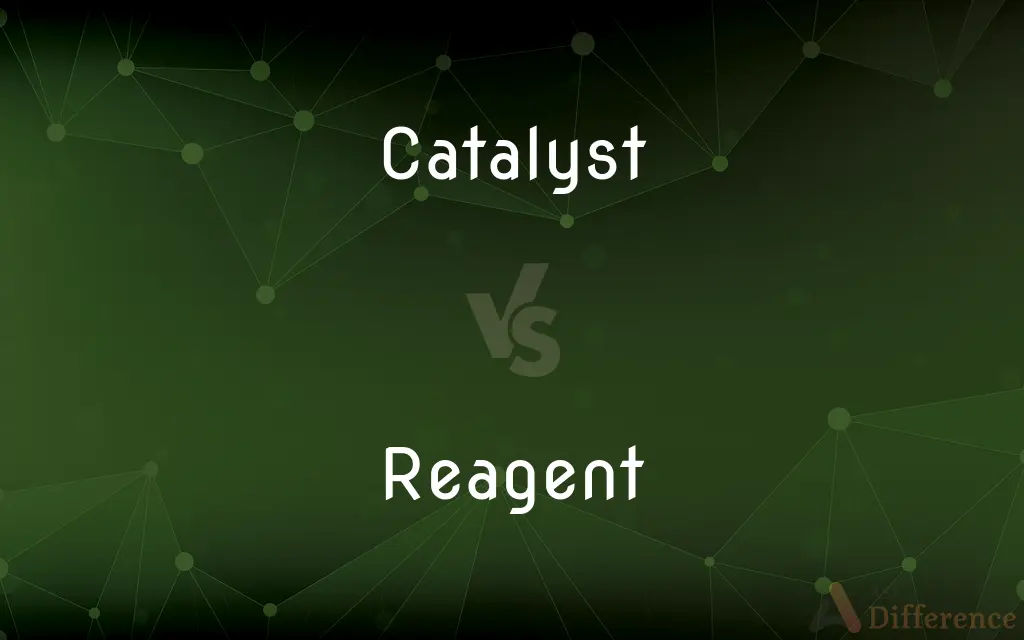Catalyst vs. Reagent — What's the Difference?
By Urooj Arif & Fiza Rafique — Updated on March 14, 2024
A catalyst speeds up a chemical reaction without being consumed, while a reagent participates directly in the reaction and is consumed.

Difference Between Catalyst and Reagent
Table of Contents
ADVERTISEMENT
Key Differences
A catalyst is a substance that increases the rate of a chemical reaction without undergoing any permanent chemical change itself. It works by lowering the activation energy required for the reaction to proceed, leading to a faster reaction rate. On the other hand, a reagent is a substance that is involved in a chemical reaction, undergoing a chemical change and being consumed in the process. It directly participates in the reaction, often determining the product's nature.
Catalysts can be used in very small quantities relative to the reactants because they are not consumed in the reaction. They emerge unchanged after the reaction has occurred. In contrast, the quantity of a reagent is directly related to the stoichiometry of the reaction, as it is consumed and transformed during the reaction.
The role of a catalyst is often to enable or accelerate reactions that are otherwise too slow to be practical. Whereas, reagents are essential for the reaction to occur, acting as the primary substances that undergo change to produce the desired chemical product.
Catalysts are often specific to certain reactions, with enzymes being a prime example of biological catalysts that facilitate complex reactions in living organisms. Reagents, however, can vary widely and include a broad range of substances, each tailored to specific types of chemical reactions.
The presence of a catalyst in a chemical process can significantly reduce the energy costs and time required for a reaction, making industrial processes more efficient and environmentally friendly. Meanwhile, the choice of reagents is crucial in determining the pathway and yield of a reaction, impacting the efficiency and selectivity of the process.
ADVERTISEMENT
Comparison Chart
Definition
A substance that increases the rate of a reaction without being consumed.
A substance that participates in and is consumed by a reaction.
Role in Reaction
Speeds up the reaction by lowering activation energy.
Directly involved in the chemical change.
Consumption
Not consumed or altered permanently.
Consumed and transformed during the reaction.
Quantity Required
Used in small amounts.
Amount is determined by the reaction stoichiometry.
Example
Enzymes in biological processes.
Hydrochloric acid in a reaction with sodium hydroxide.
Compare with Definitions
Catalyst
Used in small quantities due to its non-consumable nature.
A tiny amount of catalyst was sufficient to initiate the reaction.
Reagent
Determines the nature and yield of the product.
Changing the reagent altered the reaction outcome significantly.
Catalyst
Specific to certain reactions, enhancing reaction rates.
The catalyst was chosen for its effectiveness in the hydrogenation process.
Reagent
Directly participates in and is essential for the reaction.
The reagent was completely consumed by the end of the reaction.
Catalyst
A substance that accelerates a chemical reaction without being consumed.
Platinum acts as a catalyst in the conversion of carbon monoxide to carbon dioxide in catalytic converters.
Reagent
A substance used in a chemical reaction to produce a change.
Sodium chloride acted as a reagent in the synthesis of silver chloride.
Catalyst
Remains unchanged and can be recovered after the reaction.
After the reaction, the catalyst was retrieved and reused.
Reagent
Can be a solvent, ion, atom, or molecule involved in the reaction.
Water served as a reagent in the hydrolysis reaction.
Catalyst
An agent that induces or speeds up a reaction without changing itself.
Enzymes are natural catalysts that facilitate reactions in living organisms.
Reagent
Quantity directly related to the stoichiometry of the reaction.
A precise amount of reagent is required to ensure complete reaction.
Catalyst
A substance that increases the rate of a chemical reaction without itself undergoing any permanent chemical change
Chlorine acts as a catalyst promoting the breakdown of ozone
Reagent
A reagent is a substance or compound added to a system to cause a chemical reaction, or added to test if a reaction occurs. The terms reactant and reagent are often used interchangeably—however, a reactant is more specifically a substance consumed in the course of a chemical reaction.
Catalyst
(Chemistry) A substance, usually used in small amounts relative to the reactants, that modifies and increases the rate of a reaction without being consumed in the process.
Reagent
A substance used in a chemical reaction to detect, measure, examine, or produce other substances.
Catalyst
One that precipitates a process or event, especially without being involved in or changed by the consequences
"A free press ... has remained ... a vital catalyst to an informed and responsible electorate" (Robert O'Neal).
Reagent
(chemistry) A compound or mixture of compounds used to treat or test materials, samples, other compounds or reactants in a laboratory or sometimes an industrial setting.
Catalyst
(chemistry) A substance that increases the rate of a chemical reaction without being consumed in the process.
Reagent
A substance capable of producing with another a reaction, especially when employed to detect the presence of other bodies; a test.
Catalyst
Something that encourages progress or change.
Economic development and integration are working as a catalyst for peace.
Reagent
A chemical agent for use in chemical reactions
Catalyst
(literature) An inciting incident that sets the successive conflict into motion.
Catalyst
(automotive) A catalytic converter.
Catalyst
(fantasy) An object that facilitates the casting of a spell (such as a magic wand).
Catalyst
A substance that initiates or accelerates a chemical reaction without itself being affected; as, thousands of enzymes serve in concert as calaysts to produce the sequence of reactions we call "life"; the industrial production of cheap ammonia depended on finding a good catalyst.
Catalyst
Something that serves as a precipitating occasion for an event; as, the invasion acted as a catalyst to unite the country.
Catalyst
Something or someone that causes events to happen with itself being changed.
Catalyst
(chemistry) a substance that initiates or accelerates a chemical reaction without itself being affected
Catalyst
Something that causes an important event to happen;
The invasion acted as a catalyst to unite the country
Common Curiosities
What is a reagent?
A substance that participates in and is consumed during a chemical reaction.
How are reagents chosen for a reaction?
Reagents are chosen based on their ability to undergo the desired chemical change and produce the intended product.
Can a reaction occur without a reagent?
No, reagents are necessary for chemical reactions to produce products.
Why is the quantity of reagent important in a reaction?
The quantity of reagent determines the stoichiometry and yield of the reaction, impacting the efficiency and outcome.
What makes a good catalyst?
A good catalyst is highly efficient, specific to the reaction, and stable under the reaction conditions.
Can a catalyst be recovered after a reaction?
Yes, since catalysts are not consumed, they can often be recovered and reused.
Can a catalyst be used as a reagent?
Typically, no. Catalysts are not consumed in the reaction, whereas reagents are.
How does the presence of a catalyst affect the energy profile of a reaction?
A catalyst lowers the activation energy, making it easier for the reactants to transform into products.
Can the same substance act as a catalyst in one reaction and a reagent in another?
Yes, the role of a substance depends on the specific reaction and conditions.
How do catalysts work?
Catalysts work by lowering the activation energy needed for a reaction, facilitating a faster reaction rate.
What role do reagents play in analytical chemistry?
Reagents are used to cause reactions that allow the detection, quantification, or qualitative analysis of a substance.
Is the use of catalysts environmentally beneficial?
Yes, catalysts can make processes more efficient and reduce the need for harsh conditions, benefiting the environment.
What is a catalyst?
A substance that speeds up chemical reactions without being consumed or permanently changed.
Are enzymes catalysts or reagents?
Enzymes are catalysts because they speed up biological reactions without being consumed.
How does the use of reagents impact the cost of a chemical process?
The cost and availability of reagents can significantly affect the overall cost and feasibility of a chemical process.
Share Your Discovery

Previous Comparison
Rent vs. Book
Next Comparison
Railfan vs. FerroequinologistAuthor Spotlight
Written by
Urooj ArifUrooj is a skilled content writer at Ask Difference, known for her exceptional ability to simplify complex topics into engaging and informative content. With a passion for research and a flair for clear, concise writing, she consistently delivers articles that resonate with our diverse audience.
Co-written by
Fiza RafiqueFiza Rafique is a skilled content writer at AskDifference.com, where she meticulously refines and enhances written pieces. Drawing from her vast editorial expertise, Fiza ensures clarity, accuracy, and precision in every article. Passionate about language, she continually seeks to elevate the quality of content for readers worldwide.














































